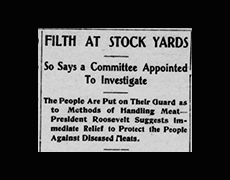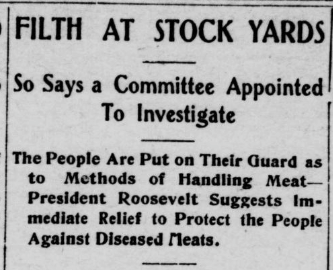
Imagine eating meat that had been dragged through the spit of workers with tuberculosis and then thrown onto dirty, wooden tables to pick up splinters and more dirt.
After reading this 1906 report on the meat plants, it is little wonder why so many people fell ill after consuming undercooked meat.
Filth at Stock Yards

It seems that complaint was recently made to the authorities at Washington, D.C. that filth and uncleanliness characterized the handling of carcasses and meats at the great stock yards, and that a commission was appointed to look into conditions.
That commission only a few days ago made its report which is an eye opener to the country at large.
Among other things, the report says:
“We saw meat shoveled from filthy wooden floors, piled on tables rarely washed, pushed from room to room in rotten box carts, in all of which processes it was in the way of gathering dirt, splinters from the floor and filth.
“It was always the reply that this meat would afterwards be cooked and that this sterilization would prevent any danger from its use.
“A very considerable portion of the meat so handled is sent out as smoked products and in the form of sausages, which are prepared to be eaten without being cooked.
“A particularly glaring instance of uncleanliness was found in a room where the best grade of sausages was being prepared for export.
“The situation, as we saw it, in these huge establishments tends necessarily and inevitably to the moral degradation of thousands of workers, who are forced to spend their working hours under conditions that are entirely unnecessary and unpardonable and which are a constant menace not only to their health, but to the health of those who use the food products prepared.
“The report further states that tuberculosis persons are constantly spitting on the floors of the meat houses over which parts of animals are frequently dragged and upon which particles of meat are constantly falling and are afterwards being worked into sausages and other food products.”
Source: The Grenada sentinel. (Grenada, Miss.), 09 June 1906.

